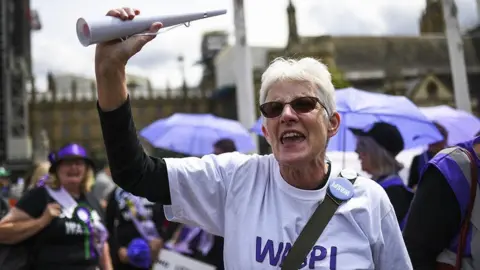ARTICLE AD BOX

 Getty Images
Getty Images
No compensation will be paid to women born in the 1950s hit by changes to the state pension age, the government has announced.
Campaigners say 3.6 million women were not properly informed of the rise in state pension age to bring them into line with men.
Work and Pensions Secretary Liz Kendall apologised for a delay in sending letters to those affected but rejected any kind of financial payouts.
Nine months ago, a parliamentary ombudsman recommended payouts of between £1,000 and £2,950 to those affected.
The Women Against State Pension Inequality (Waspi) campaign had called for payments of at least £10,000 each.
How the saga unfolded
The age at which people receive the state pension has been increasing as people live longer, and currently stands at 66 for men and women.
But for decades, men had received their state pension at 65 and women at the age of 60.
Under the 1995 Pensions Act a timetable was drawn up to equalise the age at which men and women could draw their state pension. The plan was to raise the qualifying age for women to 65 and to phase in that change from 2010 to 2020.
But the coalition government of 2010 decided to speed that up. Under the 2011 Pensions Act the new qualifying age of 65 for women was brought forward to 2018.
The increases have been controversial. Campaigners claim women born in the 1950s have been treated unfairly by the rapid changes and the way they were communicated to those affected.
Many thousands said they had no idea they would have to wait longer to receive their state pension, and had suffered financial and emotional distress as a result.

 4 weeks ago
11
4 weeks ago
11








 English (US) ·
English (US) ·